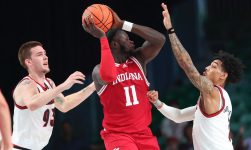The NCAA Division I Men’s Basketball Committee announced Monday that it will relocate all 13 of its previously determined preliminary round sites for the 2021 NCAA Tournament, with their sights set on moving the NCAA Tournament to a single host city.
“In recent weeks, the Division I Men’s Basketball Committee has engaged in a thorough contingency planning process to determine the most effective way to conduct a safe and healthy March Madness for all participants for the 2021 championship,” NCAA spokesman David Worlock said. “Through these discussions, it became apparent to the committee that conducting the championship at 13 preliminary round sites spread throughout the country would be very difficult to execute in the current pandemic environment. The committee has decided the championship should be held in a single geographic area to enhance the safety and well-being of the event.”
Need to know more about the 2021 NCAA Tournament? The Eye on College Basketball Podcast duo covers it all below.
NCAA staff is in preliminary discussions with the state of Indiana and the city of Indianapolis to potentially host the 68-team tournament around the metropolitan area in March and April. Indianapolis is already scheduled to be the host site for the Final Four next April.
“My committee colleagues and I did not come lightly to the difficult decision to relocate the preliminary rounds of the 2021 tournament, as we understand the disappointment 13 communities will feel to miss out on being part of March Madness next year,” Mitch Barnhart, chair of the Division I Men’s Basketball Committee and University of Kentucky athletics director, said in a statement. “With the University of Kentucky slated to host first- and second-round games in March, this is something that directly impacts our school and community, so we certainly share in their regret. The committee and staff deeply appreciate the efforts of all the host institutions and conferences, and we look forward to bringing the tournament back to the impacted sites in future years.”
Barnhart and NCAA Senior Vice President of Basketball Dan Gavitt held a Zoom conference call with the media Monday afternoon. Gavitt said the plan is still to hold the NCAA Tournament beginning in March, but expressed flexibility if necessary to push it back if circumstances dictate. He again reinforced the NCAA’s explicit mission to hold the NCAA Tournament in 2021 — it’s going to be played, and played safely, with many further details to be determined in the coming weeks and months. There is no word yet on whether or not fans will be allowed to attend the games. The number of venues needed to hold the 2021 NCAA Tournament is not yet determined, but Gavitt said at least eight is a reasonable number for a 68-team field. There are also dozens of more courts that will be needed for teams to practice at leading up to and throughout the NCAA Tournament.
The committee was careful to note that the 2021 NCAA Tournament will not be held in a “bubble,” as that’s not an accurate description of what the NCAA is attempting to pull. Instead, the preferred term is a “controlled environment.” The NCAA pays to put on the tournament and the costs are expected to be high, though no accurate estimation of how many millions of dollars it will run the organization has yet been made public.
With the pandemic still waging on, and with the NCAA determined to host the NCAA Tournament in 2021 after it was canceled in 2020 just prior to its scheduled start, the decision to aim for March Madness in one city makes the most logistical sense. It reduces risk of virus transmission that players and staffers would be exposed to by flying across country throughout the tournament, and allows all mitigation efforts to be focused in one geographic location. With 68 teams, multiple venues would be necessary to pull off the event.
“We have learned so much from monitoring other successful sporting events in the last several months, and it became clear it’s not feasible to manage this complex championship in so many different states with the challenges presented by the pandemic,” Gavitt said. “However, we are developing a solid plan to present a safe, responsible and fantastic March Madness tournament unlike any other we’ve experienced.”






